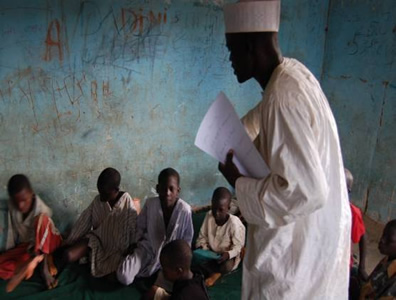Sani Hungu’s IQTE Story (Kano)
“If I say that ESSPIN’s trainings have been fulfilling then I am making an understatement! Rather I would say, it has been beneficial not only to us but also to the pupils of neighbouring schools”. These are the words of Sani Hungu from Albasu Local Government Area of Kano State.
Sani is a community teacher at a Qur’anic school in Hungu. It is heart-warming to watch him as he organises his pupils to perform group activities during a literacy lesson. The children chatter excitedly discussing the tasks assigned to them. They listen attentively and eagerly look forward to these lessons.
Sani and other colleagues have participated in ESSPIN trainings under the Islamic, Qur’anic and Tsangaya Education (IQTE) initiative. The programme supports the introduction of Hausa and English literacy and numeracy into traditional Tsangaya schools. These schools are traditionally led by Malams or Alaramma, as they are also known, who teach the children recitation of the Holy Qur’an and tenets of the Islamic faith. The community teachers are secondary school completers who are trusted by Malams and selected by their community to teach the literacy and numeracy lessons to the children. Each cluster of Qur’anic and Islamiyya Schools is also assigned a support teacher who visits classes every month to offer professional guidance and encouragement to community teachers.
The communities where these religious schools are located also get involved with the running of them. School Support Committees are made up of Malams from the Tsangaya schools, parents, community teachers and the support teachers.
“Sometimes the pupils from public schools come and observe us from the window and the door. They are curious about the pupil-centred activities that my pupils are engaged in” says Sani.
So far, ESSPIN has been implementing the IQTE programme in three local governments in Kano State and this has caught the attention of the State Government. There has now been a tangible response as funds have been spent to include other Local Government Areas in this programme. Working and monitoring groups have been set up by SUBEB to ensure this happens within an ambitious time frame.
“I know I cannot speak for Kano but I know this state will not remain the same because of what ESSPIN is doing” says Sani in a strong, unwavering voice. “Only praise and gratitude do I have for ESSPIN.”

Sani Hungu, the community teacher from Albasu LGA, working with a group of children in his Tsangaya school.